
Great Expectations, Part Thirteen: Devs are People, Too
By Sanya Weathers
One of my fondest memories is of a particular player gathering attended by one of my biggest… well, let’s be honest and call him a troll. This troll was constantly sounding off about how all the devs were liars, and that balance decisions had personal motivations behind them (either the devs played Class X and therefore it would never be nerfed, or we hated him in particular and therefore wanted to nerf his class).
Every single thing we announced, this guy found fault in it. Anyone who disagreed with him was a bootlicker and worse.
He couldn’t wait to meet me. He was going to kneecap me, among his more printable threats. (This company did not host its own message boards. If it had, the troll would still have posted, but we’d have deleted his comments, which would no doubt have spawned cries of censorship and fascism. Certainly as it was the troll photoshopped me more than once onto the Iraqi Information Minister’s body.)
I was looking forward to the meeting, because I knew how it would go. And it worked out just as I’d thought, because it always did. He showed up, discovered that he and I were both passionate about games, and realized he couldn’t actually spew hatred at someone after he’d put a face and a personality to a name.
He went home and continued to be a bit of a tinfoil hat wearing jerk on the forums, but he never again spewed personal vitriol or attempted to spread lies about the product.
Back then, I was still new to community management. I attended every possible live event to meet my trolls in person, because I recognized the power of the personal bond. If I’d been the jaded… seasoned professional I am today, I’d have been proactive instead of reactive – I’d have made myself and the other developers into people from the start, instead of allowing us to look like a faceless monolith. I wouldn’t have allowed a situation to develop where the users had the option of seeing us as Other, instead of basically players with awesome jobs. I’d have used the power of the internet to bring people into the office with me.
Expectation management is about being proactive, not reactive.
Some things that work:
– Meet the people. Go through most of the office, but skip the lovely corner office belonging to the money guy – that person is irrelevant to the user’s experience. Film the CS pit and the QA room in all their, er, glory. Show the players the developer whose job it is to check the loot tables for errors. Talk about item design with the implementers.
– Take questions from players and answer them on video. Be sure to mention the player by name, and thank him or her on video as well.
– Skip the sanitizer. Don’t dress up the workers or clean up the space. Show people deep in discussion about critical game components. Make it clear that the company is a team, and that decisions aren’t arrived at lightly – and that people disagree.
– Don’t screw around too much. Players like to see the team is having fun, but only to a point. Too much “fun” on film gives the impression that the developers aren’t 100% serious about putting out the best possible product. For every foosball tournament, show people burning the midnight oil. Talk about how many customer appeals are answered in an hour. Allow the people you’re filming to say “go away, or XYZ won’t make it into the patch next month.”
– But don’t go too far with the fluff. For every “getting to know you” feature, there should be at least three substantive posts and discussions before launch. And after launch, at most this should be a weekly thing. You’re trying to maintain a personal connection with evangelists and social connectors, but the vast majority of your players don’t care. Remember, after launch, the main thing people are thinking when they come to your site is “what’s in it for me.”

